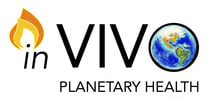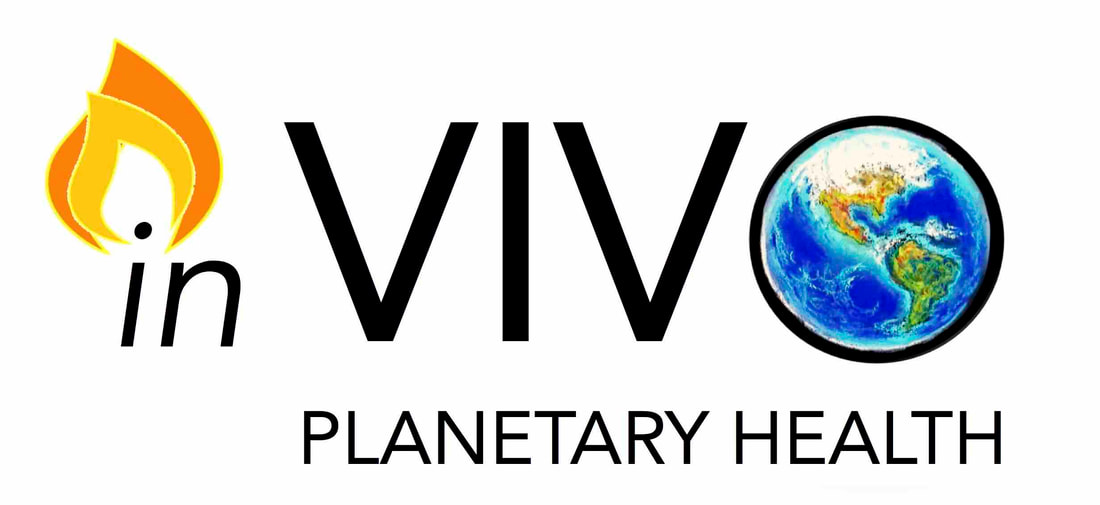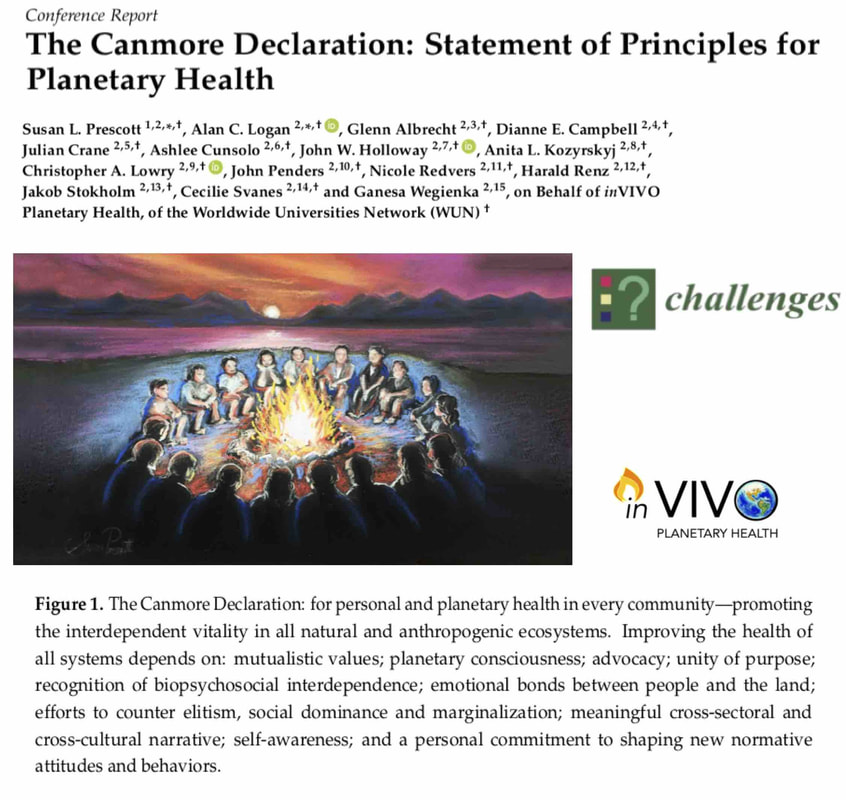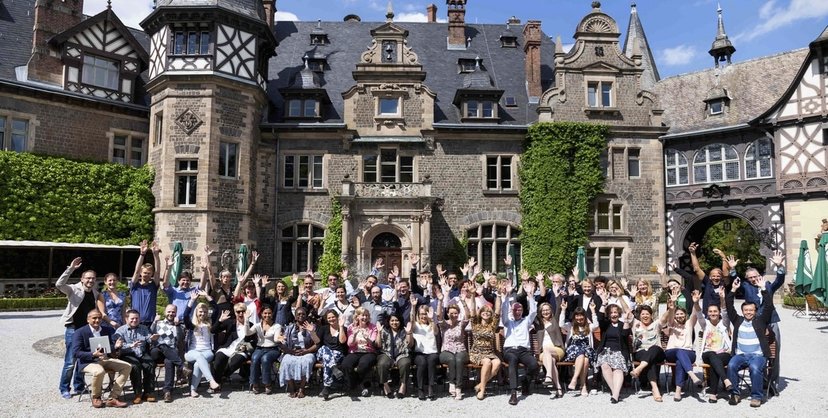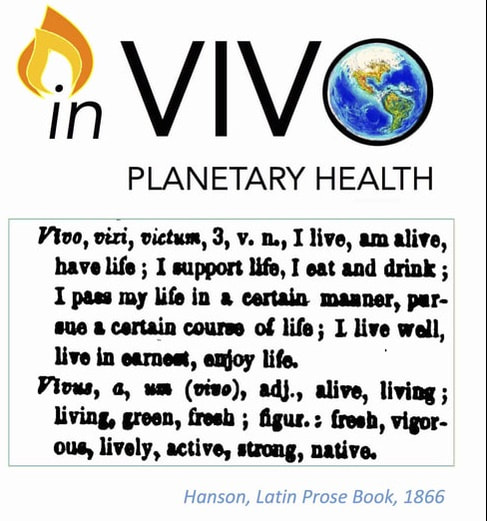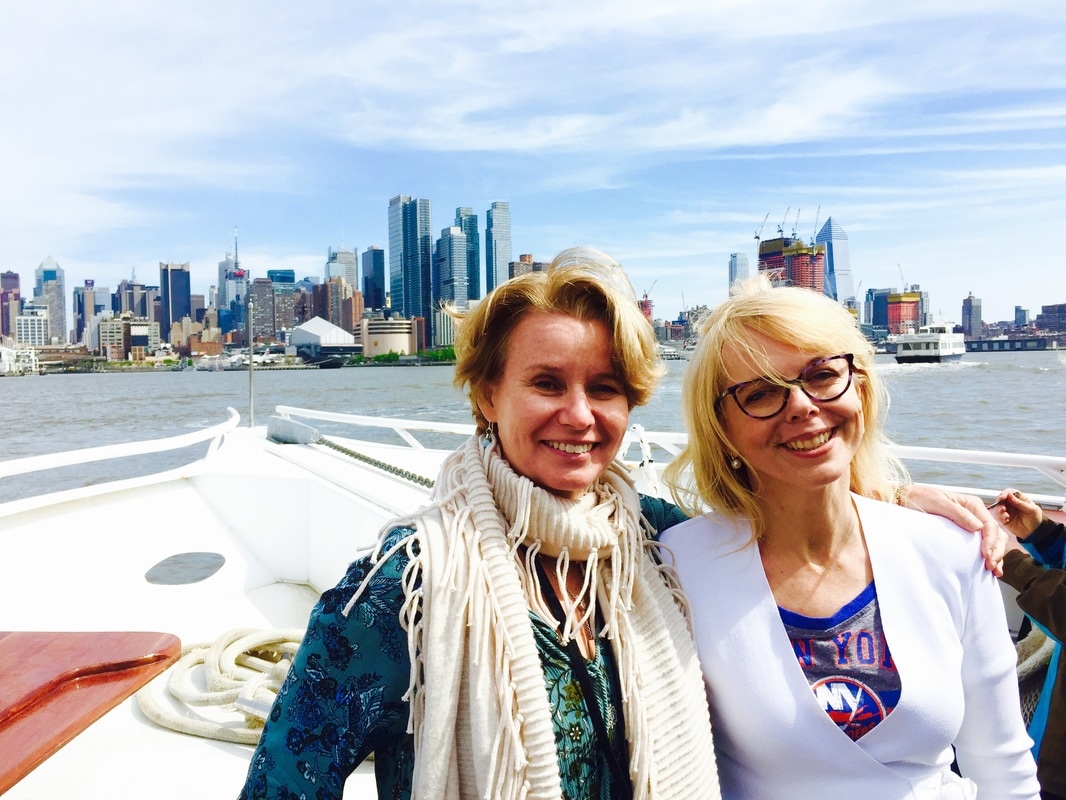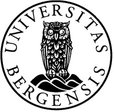People, Place, Purpose, Planet
|
We are a progressive scientific movement providing evidence, advocacy and inspiration
to align the interests of vitality of people, place and planet To learn more about our history and philosophies...please read on!
|
The Canmore Declaration
|
The concept of planetary health emphasizes that human health is intricately connected to the health of natural systems within the Earth’s biosphere—and that the health of all species depends on the health, biodiversity and stability of whole systems. Planetary health is a product of human social, political and economic ‘ecosystems’.
The global challenges facing humanity include climate change, biodiversity losses, population growth, grotesque socioeconomic inequalities, environmental degradation, health disparities, the dominance of ultra-processed foods, and the pandemic crisis of non-communicable diseases (NCDs). In addition, there is ongoing political polarization and conflict, and growing ‘dis-ease’ which compromises quality of life and sets individuals on a path to NCDs. These concerns are all interrelated; health at all levels—person, place and planet—is interdependent.
Against this background, personal and public health have become planetary health and vice versa - and virtually every aspect of society must be allied in this new reality. This will help to strike a balance between socioeconomic development and sustainability – and addressing inequities in health and access to biodiversity and health promoting natural environments as a matter of social and “ecological justice”.
inVIVO Planetary Health is a diverse group of scientists, clinicians, educators and advocates from many fields, who recognize the importance of approaching complex environmental issues from a holistic and integrated perspective – extending and combining the typical focus on the biological and psychological level, with the wider sociological and environmental determinants of human health – and understanding how these are inter-related to societal health. This initiative provides both the impetus for a series of specific projects and provides an umbrella framework to integrate these in a unique way.
The global challenges facing humanity include climate change, biodiversity losses, population growth, grotesque socioeconomic inequalities, environmental degradation, health disparities, the dominance of ultra-processed foods, and the pandemic crisis of non-communicable diseases (NCDs). In addition, there is ongoing political polarization and conflict, and growing ‘dis-ease’ which compromises quality of life and sets individuals on a path to NCDs. These concerns are all interrelated; health at all levels—person, place and planet—is interdependent.
Against this background, personal and public health have become planetary health and vice versa - and virtually every aspect of society must be allied in this new reality. This will help to strike a balance between socioeconomic development and sustainability – and addressing inequities in health and access to biodiversity and health promoting natural environments as a matter of social and “ecological justice”.
inVIVO Planetary Health is a diverse group of scientists, clinicians, educators and advocates from many fields, who recognize the importance of approaching complex environmental issues from a holistic and integrated perspective – extending and combining the typical focus on the biological and psychological level, with the wider sociological and environmental determinants of human health – and understanding how these are inter-related to societal health. This initiative provides both the impetus for a series of specific projects and provides an umbrella framework to integrate these in a unique way.
To restore human health we must restore the health of our society and our relationship with the natural environment
– with a greater sense of unity, place and purpose”
What's in a name?Our name 'inVIVO' was chosen to reflect the vitality, awe and all-encompassing nature and biodiversity of life within and around us. As well as the biological and scientific use of the word, its wider meaning captures the deeper purpose and broader elements that are key to personal, public and planetary health. Inspired by the latin roots of the word:
"I live, am alive, have life; I support life, I eat and drink; I pass my life in certain manner, pursue a certain course of life; I live well, I live in earnest, enjoy life.....alive, living; living, green, fresh, vigorous, lively, active, strong, native" (Hanson 1866) |
Ecological impact on all levels
inVIVO Planetary Health provides an integrative systems framework for understanding the eco-biological impact of living environments (including biodiversity) on microbial diversity and life-course human health. We are particularly focused on the impact of 'dysbiotic drift' on global health, as a common unifying link to many aspects of human health and adverse environmental exposures. We recognise the need to take a broad and integrated approach which recognises the inter-related and interdependent nature of these challenges from a developmental perspective across multiple diverse domains – the only way these challenges can be addressed.
Our philosophies - "It's All Connected"
The inVIVO initiative recognises that the health of humanity (in every sense) is interdependent on the health of the environment. We see the need to have a more expansive (broad and long ranging) vision in addressing human, environmental and planetary health. It draws on the overarching premise that ‘it is time to shape a better future’ – emphasizing the imperative for change: on all levels
|
Humanity is dealing with a dual burden: not only are we exposed to many ‘new’ things that are ‘unhealthy’ for us (e.g. fast food, toxins and stress) we are also losing what was ‘good’ for health and wellbeing in our ancestral environments. The facets of ‘loss’ are often overlooked in this agenda and extend from the physical (e.g. loss of biodiversity, species, local foods and produce) to the loss of community (loss of language, tradition, and stories) and the far less tangible aspects of loss (such as loss of value systems, loss of privacy and solitude, peace, respect, spirituality, compassion, awe and wonder) - eroding our sense of purpose, place and identity. It may be argued that our shifting values and loss of deeper purpose are a root cause of social and economic instability and underlie the more superficial drivers of environmental and societal degradation. This erosion is gradual and associated with a shift in the ‘normative’ position to one of greed and self-interest. To some extent this has ‘radicalized’ empathy, kindness and compassion.
|
Founder and Director, Prof Susan Prescott (right) and Co-Director, Prof Dianne Campbell (New York 2017)
|
At the same time, we are carrying the increasing burden of technology and a culture of unhealthy ‘excess’: ultra-processed food, sedentary indoor behaviour, air and water contamination, excessive noise and light pollution, stress, electromagnetic radiation, screen-time, sleep disruption and many other adverse exposures that were not present in traditional environments.
Of great concern, the burden and consequences of these adverse exposures is greatest in the socially disadvantaged - amplifying the disparities in health and opportunity, and further widening social inequity. Together with the 'missing' elements (e.g. absence of green space) the many adversities associated with urbanicity are eroding health in built environments with the higher burden of NCDs shouldered by disadvantaged populations. Viewed through the lens of ‘connectedness’ (i.e that we are all interconnected), this inequity can (and should be) viewed as a fundamental imbalance in our ‘social ecosystem’ which systemic consequences for all of us and beyond to our ‘environmental ecosystems’.
Of great concern, the burden and consequences of these adverse exposures is greatest in the socially disadvantaged - amplifying the disparities in health and opportunity, and further widening social inequity. Together with the 'missing' elements (e.g. absence of green space) the many adversities associated with urbanicity are eroding health in built environments with the higher burden of NCDs shouldered by disadvantaged populations. Viewed through the lens of ‘connectedness’ (i.e that we are all interconnected), this inequity can (and should be) viewed as a fundamental imbalance in our ‘social ecosystem’ which systemic consequences for all of us and beyond to our ‘environmental ecosystems’.
Addressing the greatest threats to human health:
The rising burden of non-communicable diseases (NCDs) now poses the greatest threat to global health. Inflammation is a common element in almost all these diseases, including obesity, allergies, asthma, autoimmune disorders, cardiovascular and metabolic diseases, cancer, and neurodegenerative conditions. A substantial component of the risk of all NCDs is programmed in early life, and the impact of the early environment on the developing immune system plays an especially important role in promoting the lifelong risk of inflammation in many organ systems. Virtually all environmental risk factors are inexorably linked with the wider social, economic and political determinants of disease, and the solutions depend on long term policies that overcome dysbiosis, inequity and injustice - from the first moments of life.
Thus, at this critical time in human history, low grade inflammation and immune dysfunction are both a non-communicable disease (NCD) reality and a metaphor for broken systems. In this new era, it is becoming increasingly important to integrate seemingly disconnected areas of research. This is the ongoing mandate of inVIVO Planetary Health
Thus, at this critical time in human history, low grade inflammation and immune dysfunction are both a non-communicable disease (NCD) reality and a metaphor for broken systems. In this new era, it is becoming increasingly important to integrate seemingly disconnected areas of research. This is the ongoing mandate of inVIVO Planetary Health
The Origins and Culture of inVIVO:
Founded in 2012, this initiative (formerly 'inFLAME') was established through the Worldwide Universities Network by Professor Susan Prescott to address the risk factors, pathways and strategies to overcome the rising propensity for chronic inflammatory disorders, with a focus on early effects on the developing immune system. From the outset, we have recognized the importance of a multi-dimensional collaborative approach welcoming a broad range of expertise and novel perspectives. With each successive year, our agenda has broadened to examine the wider determinants of human and environmental health – and the need to examine these in a more integrated way.
We embrace friendship, and a culture of generosity and open collaboration for mutual benefit. Our annual meetings provide a rich environment for discussion and new ideas, and provide many opportunities and mentoring for early career researchers. Our global family has grown rapidly not only because of the scientific fellowship but because of the enormously positive experience it provides for participants, who frequently describe our annual workshops as the “best meetings they have ever attended”. We pride ourselves as much for what we do, as how we do it!
We embrace friendship, and a culture of generosity and open collaboration for mutual benefit. Our annual meetings provide a rich environment for discussion and new ideas, and provide many opportunities and mentoring for early career researchers. Our global family has grown rapidly not only because of the scientific fellowship but because of the enormously positive experience it provides for participants, who frequently describe our annual workshops as the “best meetings they have ever attended”. We pride ourselves as much for what we do, as how we do it!
The Immune System as a connective cross-disciplinary narrative:
From the outset, our focus on the immune system has provided an ideal platform for multidisciplinary research and advocacy that spans almost every aspect of the human condition and the health of the environment in which we live - It has provided a clear pathway to link conversations between large-scale ecological changes with environmental degradation, and the micro-scale impact on the microbiome and human health.
This approach is based on the central role of the immune system for all aspects of physical and mental wellbeing, and a critical determinant of health, longevity, resilience and susceptibility to disease. The immune system is our primary sensory interface with the external world, and highly responsive to subtle changes in environmental conditions. Immune function has a fundamental effect on all systems and functions, with implications for all aspects of health. Therefore, any factor that influences our immune health can have multisystem effects – including ‘external’ factors such as microbes, biodiversity, nutrition, pollutants, and adversity, as well as ‘internal’ conditions including perceptions, emotions and stressreactions. stress and emotions. Thus, we see the immune system at the core of everything human: Influenced by everything in the external world, with influences on everything within us. In this we see the opportunity to join any conversation - about health, about the environment, about the future.
This approach is based on the central role of the immune system for all aspects of physical and mental wellbeing, and a critical determinant of health, longevity, resilience and susceptibility to disease. The immune system is our primary sensory interface with the external world, and highly responsive to subtle changes in environmental conditions. Immune function has a fundamental effect on all systems and functions, with implications for all aspects of health. Therefore, any factor that influences our immune health can have multisystem effects – including ‘external’ factors such as microbes, biodiversity, nutrition, pollutants, and adversity, as well as ‘internal’ conditions including perceptions, emotions and stressreactions. stress and emotions. Thus, we see the immune system at the core of everything human: Influenced by everything in the external world, with influences on everything within us. In this we see the opportunity to join any conversation - about health, about the environment, about the future.
We can all contribute to the
important questions of our time
How can we live with all of our modern technology but also take advantage of what once was? How can we promote health through biodiversity and connection with natural environments? What are the obstacles to change? What are the consequences of continuing on our current trajectory? Can a change in social values systems have a flow on effect that can drive meaningful positive change across multiple domains? And reduce inequity of resources?
